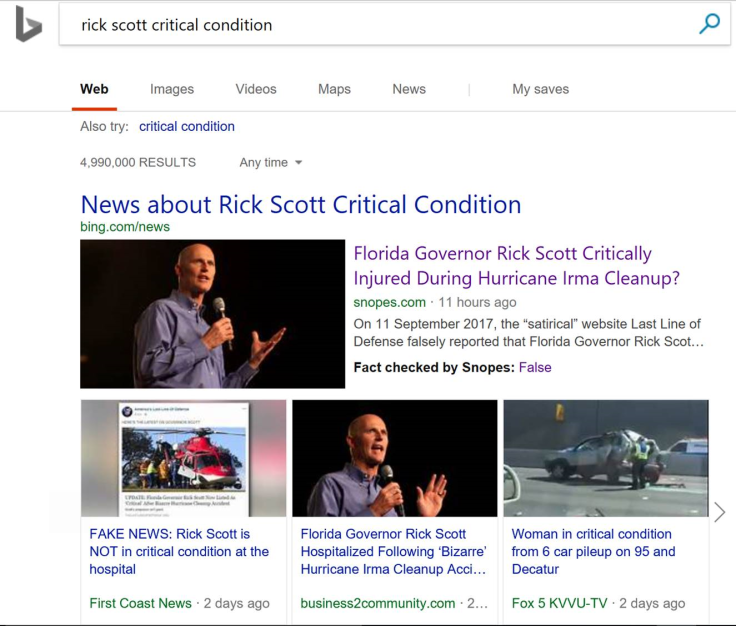Bing Follows Google Fake News Fight, Adds Fact Check To Search Results

Following Google’s steps, Bing announced Friday it will include fact-checking labels in its search results.
Bing’s new “Fact Check” label feature will help internet surfers see which stories are real and which aren’t. The tag will show up on news, major stories and web pages within the search results in a broad range of categories, including current event, health, science and politics, Bing said.
The site will use fact checks from Snope and PolitiFact for stories appearing on search results’ preview. While not all articles appearing in the results will be fact-checked, the company hopes the labels on some stories will have an effect on other ones related to it, as users will be able to see that the story was already been proved wrong on another site.
“The label may be used on both news articles and web pages that Bing has determined contain fact check information to allow users to have additional information to judge for themselves what information on the internet is trustworthy,” Bing said in a post.
Search results with a fake news story will display a “False” label on it and display which organization fact-checked the article.
The fact check label looks like this:
The feature will be run on the schema.org ClaimReview markup. Bing gave some advice to those who want to add the tag to their articles or webpages:
•The analysis must be transparent about sources and methods, with citations and references to primary sources included.
•Claims and claim checks must be easily identified within the body of fact-check content. Readers should be able to determine and understand what was checked and what conclusions were reached.
•The page hosting the ClaimReview markup must have at least a brief summary of the fact check and the evaluation if not the full text.
Google and Facebook’s Fight Against Fake News
Last October, Google introduced fact-check tags for Google News in the U.S. and the U.K., and in April the company announced the feature’s expansion in Search worldwide. The label identifies stories that include information fact-checked by news publishers and fact-checking organizations, such as PolitiFact and Snopes. Users searching on Google can see a tag with the search engine’s other labels like opinion, local source and highly cited.
In an effort to curb fake news, Facebook launched an educational tool earlier this year to help users spot false stories.
The crackdown on fake news comes after the divisive 2016 presidential election which saw numerous false stories and Russian propaganda circulate the internet, especially on Facebook. The social media company gave FBI Special Counsel Robert Mueller records of ads and other information that it discovered on its platform linked to a Russian troll farm, as well as accounts that brought the ads to American voters, according to CNN and the Wall Street Journal.
© Copyright IBTimes 2025. All rights reserved.



















